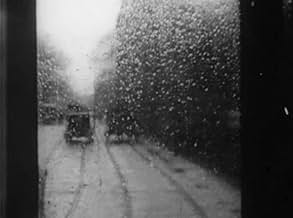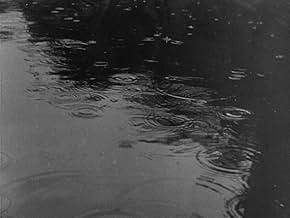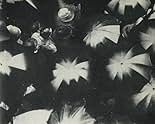La pluie tombe sur une ville néerlandaise.La pluie tombe sur une ville néerlandaise.La pluie tombe sur une ville néerlandaise.
Avis à la une
I watched Regen yesterday, for the first time. I had read a lot about it and was expecting a masterpiece. Something was not there - something was missing - or something was too much. I saw it for the second time. The images were fantastic - but something was impeding me to feel the masterpiece.
I thought that I was too tired - Regen was coming after two hours of watching other short movies, by Epstein, Eisenstein, Weinberg ... So I was definitely tired.
I took a break and went to the kitchen to eat something, then I came back. I saw it once more. I had an idea - I cut the sound - and I saw Regen again - and now I felt the masterpiece! It is a masterpiece. Only in its simplicity it has a grandeur, a greatness - and the music (which is fine) is not at the same level of greatness - of simplicity and greatness.
I saw it then several times - it is like a spell, it is binding you.
I thought that I was too tired - Regen was coming after two hours of watching other short movies, by Epstein, Eisenstein, Weinberg ... So I was definitely tired.
I took a break and went to the kitchen to eat something, then I came back. I saw it once more. I had an idea - I cut the sound - and I saw Regen again - and now I felt the masterpiece! It is a masterpiece. Only in its simplicity it has a grandeur, a greatness - and the music (which is fine) is not at the same level of greatness - of simplicity and greatness.
I saw it then several times - it is like a spell, it is binding you.
This early dutch short film will confuse everyone who thinks cinema is a medium only fit to tell stories. Predating some of the most interesting --and lyrical-- documentaries of recent times, devoid of spoken words or any logical discourse, "Regen" offers a few, brief impressions of a rainy afternoon in Amsterdam; they do not form a sequence, they do not tell anything, but they definitely convey a sense of melancholy and quietness. If a conventional movie is the equivalent of a novel, or a short story, this should be regarded as a poem: it is concerned not with what's next, but with what's there, with perceptions of things.
Fans of Ron Fricke's "Baraka", Godfrey Reggio's "Powaqqatsi", or Peter Greenaway's "Prospero's Books", should try to find this relatively unknown film. The poetry of its images, underlined by its beautiful score, is truly memorable.
Fans of Ron Fricke's "Baraka", Godfrey Reggio's "Powaqqatsi", or Peter Greenaway's "Prospero's Books", should try to find this relatively unknown film. The poetry of its images, underlined by its beautiful score, is truly memorable.
The above review strikes me as particularly unhelpful for people who are actually interested in avant-garde, and poetic cinema. Yes it is slow, if you were expecting an action movie, and yes it is a silent film, but there are very few silent films which explore the poetry of the banal, the sublime everydayness of existenz. To me, it is one of the most beautiful and subtle films of all time, and is one of the first genuine "poem" films (along with H20 by Ralph Steiner, Manhatta by Paul Strand, Berlin: City of a Symphony by Walter Ruttman, and $24 Island by Robert Flaherty among others).
The French philosopher Gilles Deleuze (in his book on cinema, The Movement-Image) gives a wonderful reading of this film in which he argues that the film is no longer a representation of rain, but is attempting to give the viewer the feeling, or pure "quality" of rain, called a "qualisign". The editing is not unlike Robert Bresson in the fragmentation and use of what Deleuze calls the "any-space-whatever". In Rain the shots do not have a signed linear sequence, and have no forward movement in time (there is no character moving through the spaces, nothing to make one shot "before" or "after" another one in time). This means that all of the shots could have happened all at the exact same time, theoretically. This is one of the qualities of an any-space-whatever, a space in which the spatial and temporal potentials are de-connected (unlike a fiction or documentary film which has cohesive spatial and temporal dimensions).
Amazing movie which has gone on to influence many great poem-film-makers like Stan Brakhage, Marie Menken, Joanna Margaret Paul, Nathaniel Dorsky, Alexander Greenhough, myself and many others.
The French philosopher Gilles Deleuze (in his book on cinema, The Movement-Image) gives a wonderful reading of this film in which he argues that the film is no longer a representation of rain, but is attempting to give the viewer the feeling, or pure "quality" of rain, called a "qualisign". The editing is not unlike Robert Bresson in the fragmentation and use of what Deleuze calls the "any-space-whatever". In Rain the shots do not have a signed linear sequence, and have no forward movement in time (there is no character moving through the spaces, nothing to make one shot "before" or "after" another one in time). This means that all of the shots could have happened all at the exact same time, theoretically. This is one of the qualities of an any-space-whatever, a space in which the spatial and temporal potentials are de-connected (unlike a fiction or documentary film which has cohesive spatial and temporal dimensions).
Amazing movie which has gone on to influence many great poem-film-makers like Stan Brakhage, Marie Menken, Joanna Margaret Paul, Nathaniel Dorsky, Alexander Greenhough, myself and many others.
This is a short documentary from the city-symphony genre of film in the early era of film. Unlike most city symphonies, Rain has more of a narrative structure as it shows Amsterdam and it's inhabitants immediately before, during, and after the rainfall. The gentle melodic strumming of guitar accompanies the various images and provides for an added tranquil experience. The film is shot using often obscure angles and close ups of images out of their normal range of view. As it was made during the silent era, there are no words to taint the beauty/ experience and the images are allowed to speak for themselves- while each viewer is allowed to connect and relate their own experience with the anticipation of rain. The film is short and sweet and perhaps one of the most naturally compelling visions of early or even later cinema. If you have the rare opportunity to view this piece of art, I highly suggest it.
This silent film from Holland depicts the start and affects of a rain shower in the city of Amsterdam. It is a very beautiful movie with a good score, but the movie is definitely slow. It is not particularly interesting either. It is just an old and simple silent film that is not especially important. If you get chance to see it, you should just to see how far film has come in 70 years.
Le saviez-vous
- AnecdotesIn 2007, this film was selected into the Canon of Dutch Cinema, which is comprised of "sixteen important and defining movies that show the versatility of Dutch movie history".
- ConnexionsFeatured in Aquarius: Joris Ivens (1976)
Meilleurs choix
Connectez-vous pour évaluer et suivre la liste de favoris afin de recevoir des recommandations personnalisées
Détails
- Durée
- 14min
- Couleur
- Mixage
- Rapport de forme
- 1.33 : 1
Contribuer à cette page
Suggérer une modification ou ajouter du contenu manquant



















